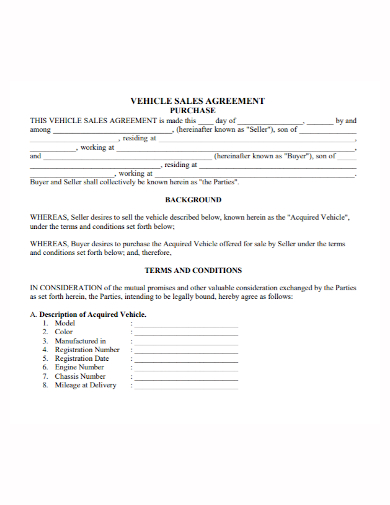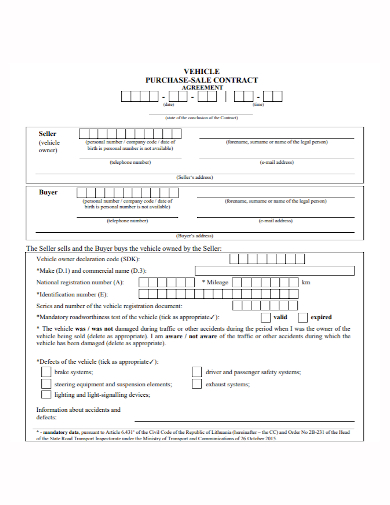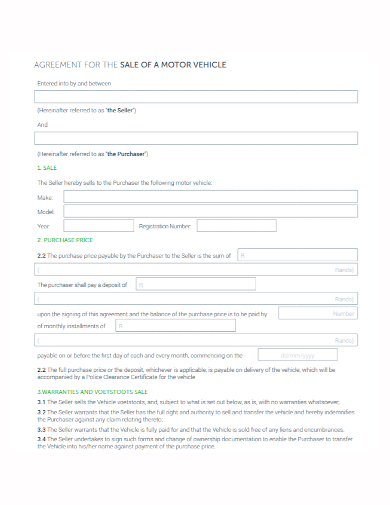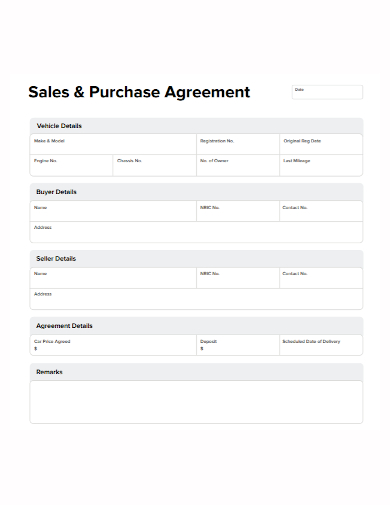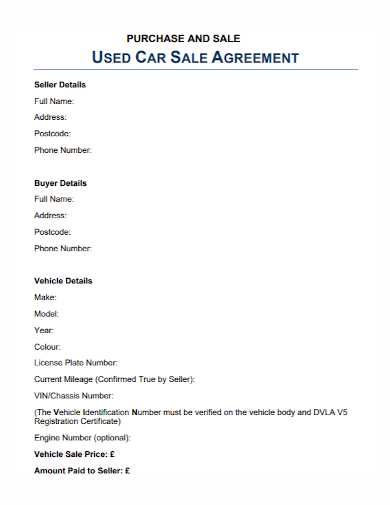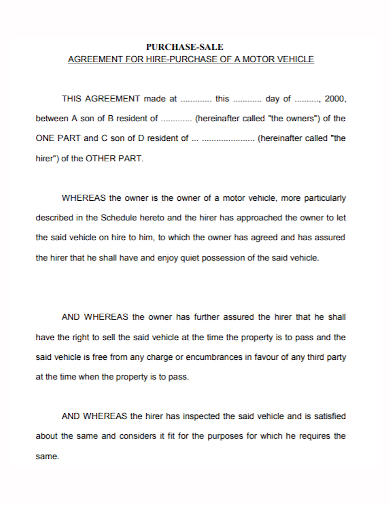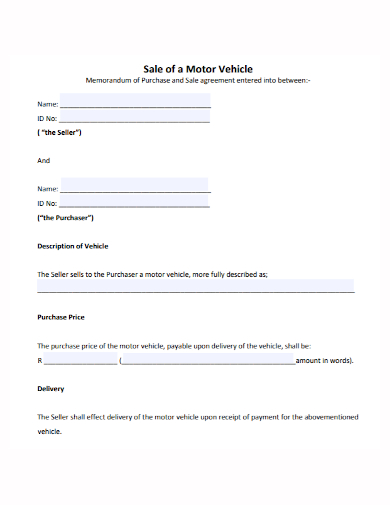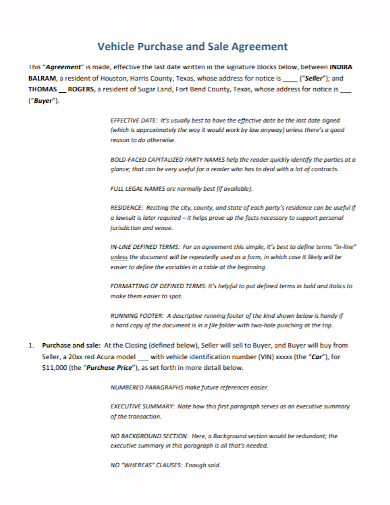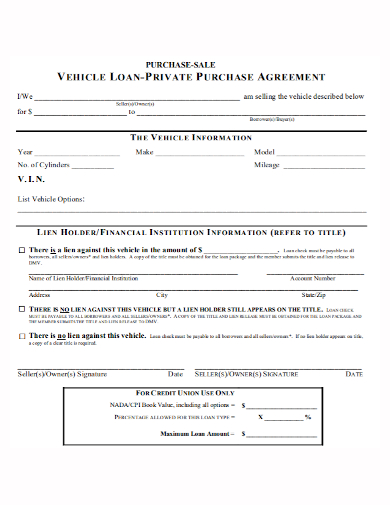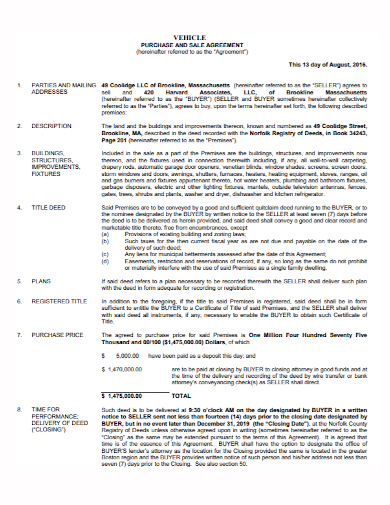After you’ve decided on which car you want to buy, the final step is to complete the paperwork. Signatures on the car purchase contract or agreement are usually required as part of this process. This document contains all of the necessary information regarding the car deal you and the dealership/seller entered into. You should read and understand the entire purchase agreement, just as you would any other contract.
10+ Vehicle Purchase and Sale Agreement Samples
It is common practice to include buyer and seller information at the start of a purchase agreement. The dealership is referred to as the seller, and you are referred to as the buyer; there is also information about the vehicle, such as the manufacturer, the make, the model, the model year, the VIN, and the mileage. All of this information should be thoroughly examined to ensure that it corresponds to the information on the vehicle you are purchasing.
A vehicle purchase agreement, also known as a vehicle contract, is a contract that governs the sale and purchase of a car or another vehicle. As a result, “vehicle purchase agreement” is a broad term that can refer to a variety of different types of purchase agreements as long as they all involve the sale of a vehicle.
1. Vehicle Purchase and Sale Agreement Template
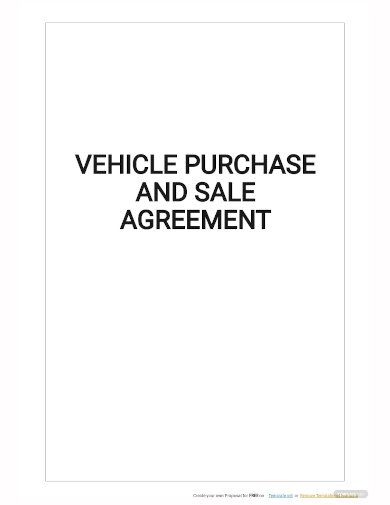
2. Vehicle Purchase and Sale Agreement
3. Vehicle Purchase and Sale Contract Agreement
4. Motor Vehicle Purchase and Sale Agreement
5. Vehicle Sale and Purchase Agreement
6. Used Vehicle Purchase and Sale Agreement
7. Vehicle Hire Purchase and Sale Agreement
8. Sample Vehicle Purchase and Sale Agreement
9. Standard Vehicle Purchase and Sale Agreement
10. Vehicle Loan Purchase and Sale Agreement
11. Basic Vehicle Purchase and Sale Agreement
Elements of a Vehicle Purchase and Sale Agreement
To complete a sale, dealerships always use a purchase agreement, which is a contract between the buyer and the seller. However, if you are buying a car from a private seller, you will be required to sign a Bill of Sale, which is a simplified form of a purchase agreement. Such documentation is required for the private individual to show proof that he or she is no longer in possession of the vehicle in the event of a hit-and-run accident or if the vehicle is abandoned. The buyer can use the Bill-of-Sale as a “pink slip” until the paperwork for the new owner is completed.
The “Bill of Sale” is the most basic type of purchase contract, and it’s typically used in private party sales where full payment is expected at the time of purchase. It’s a short document, usually only a page long, that contains the following information:
- The seller’s full name and complete address.
- The buyer’s full name and complete address.
- The make, model, year, and color of the vehicle are all important details to know.
- The VIN (Vehicle Identification Number) is a number that identifies a vehicle
- The odometer reading at the time of sale.
- The date on which the sale was completed.
- The vehicle’s purchase price.
- Signatures of both the seller and the buyer were affixed.
The agreement you sign with a dealership is more complicated, especially when the buyer is financing a new vehicle. The dealership requires so many documents that it’s easy to feel overwhelmed and discouraged, especially if you’re buying a car for the first time. However, upon closer inspection, the documents appear to be straightforward and simple to comprehend. The forms to be completed are standard and are usually the same in all states because dealerships are required to use the same general contract form.
FAQs
What are some of the risks in selling a vehicle?
- The entire vehicle value is paid via a PayPal or similar account created with false credit card details by fraudulent buyers posing as potential buyers.
- For the completion of the sale and collection of the vehicle, fraudulent car buying companies will ask you to pay a refundable deposit.
- Payment is not made or cleared until after the vehicle has been released, including payments made with forged bankers’ cheques or through bogus escrow services.
- Your vehicle is being driven away without being paid.
- Thieves recognize the location from the photo in your advertisement and steal your vehicle.
- Because they appeared in the photo in your advertisement, your vehicle’s number plates were cloned and applied to the same type and color of vehicle for use in more serious crimes.
How do you practice safe buying?
- When you physically collect the vehicle from the seller, you must pay for it. Never send money overseas, or give any money (including a deposit on a vehicle you haven’t seen and inspected) to a ‘payment protection service.
- If the vehicle is being offered at a significantly lower price, it could be a sign of a scam; always get a valuation or compare the price on Auto Trader or similar sites.
- Check for photos that have been copied from other websites using Google image search; this could save you from being duped into buying a non-existent vehicle.
- Before handing over any money, inspect the vehicle and its documentation, including the V5C document, service history, and MOT certificates.
How do you practice safe selling?
- Ensure that any test driver has a current driver’s license and adequate insurance coverage. You could be held liable for any mishaps they have.
- Keep hold of your buyers’ keys at all times and don’t leave them in the ignition to avoid them being left alone (and possibly driving away) with your vehicle.
- If a potential buyer requests a test drive, whether accompanied or unaccompanied, do everything you can to avoid infection with COVID-19 (Coronavirus).
- Never hand over the keys or documents to the vehicle until your bank has confirmed that the full value of the vehicle has been deposited into your account.
- Never send money to a foreign country.
- Paying a large deposit is never a good idea.
When reviewing your car sale contract, keep all of these factors in mind. Prior to purchasing a car, the buyer should be aware of the requirements. The agreement document contains all of this information. However, before signing, double-check that all of the information on the document is correct. Let’s move on to the things you should consider before signing your name.
Related Posts
FREE 10+ Mentoring Agreement Samples In MS Word | Apple Pages | PDF
FREE 10+ Partner Agreement Samples In MS Word | Google Docs | Apple Pages | PDF
FREE 10+ Individual Agreement Samples In MS Word | Google Docs | Apple Pages | PDF
FREE 10+ Strategic Agreement Samples In MS Word | Google Docs | Apple Pages | PDF
FREE 10+ Equity Agreement Samples In MS Word | Google Docs | Apple Pages | PDF
FREE 10+ Producer Agreement Samples in MS Word | Apple Pages | PDF
FREE 10+ Grant Agreement Samples In MS Word | Apple Pages | PDF
FREE 8+ Meeting Agreement Samples in MS Word | Google Docs | Apple Pages | PDF
FREE 10+ Community Agreement Samples In MS Word | Google Docs | PDF
FREE 8+ Real Estate Option Agreement Samples in MS Word | PDF
FREE 10+ Call Option Agreement Samples In MS Word | PDF
FREE 10+ Advertising Agreement Samples In MS Word | Google Docs | Apple Pages | PDF
FREE 10+ Car Agreement Samples In MS Word | Google Docs | Apple Pages | PDF
FREE 10+ Horse Agreement Samples In MS Word | Apple Pages | PDF
FREE 10+ Option Agreement Samples In MS Word | Google Docs | Apple Pages | PDF

